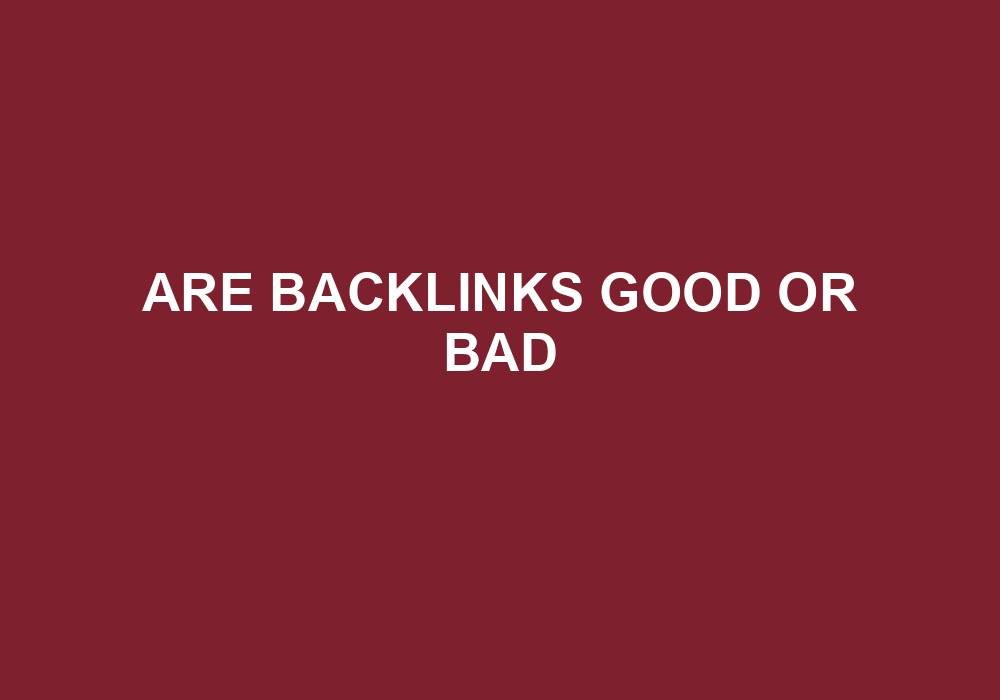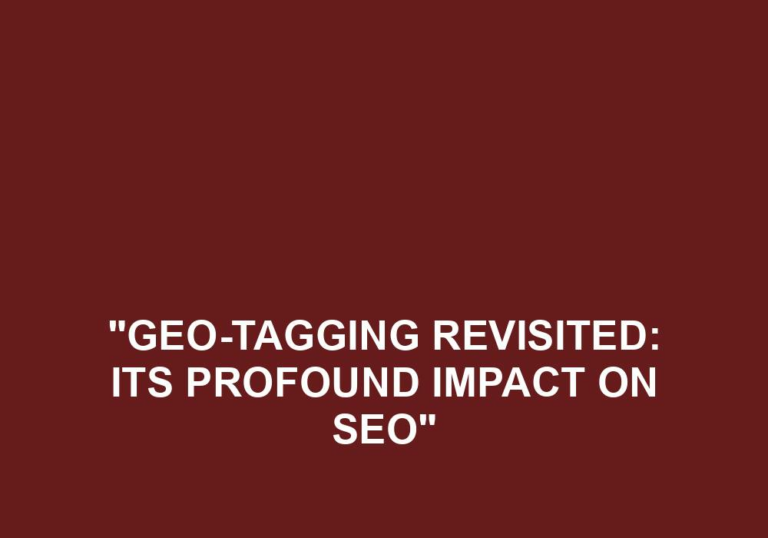In the vast realm of search engine optimization (SEO), one debate that continues to stir the pot is the question of whether backlinks are good or bad. As website owners and digital marketers strive to climb the ranks of search engine results pages, the importance of backlinks cannot be understated. On one side of the argument, proponents argue that backlinks are a vital tool for boosting a website’s visibility and credibility. On the other side, skeptics claim that backlinks can lead to penalizations and a decline in organic search rankings. So, are backlinks a blessing or a curse? Let’s delve into this contentious topic and uncover the truth behind the power of backlinks.
First and foremost, it is crucial to understand the role that backlinks play in the intricate web of SEO. Backlinks, also known as inbound or incoming links, are essentially the digital equivalent of a referral. When a reputable website links back to your content, it signals to search engines that your website is trustworthy and offers valuable information. This endorsement from other websites can significantly impact your website’s ranking potential. However, it is important to tread carefully, as not all backlinks are created equal. While high-quality, relevant backlinks can propel your website to new heights, low-quality or spammy backlinks can do more harm than good. So, the key lies in understanding the nuances of backlinking and implementing a strategic approach that aligns with search engine guidelines.
Backlinks can be both good and bad, depending on how they are obtained and used. Good backlinks come from reputable websites and can improve your search engine rankings. However, bad backlinks from spammy or low-quality sites can harm your site’s reputation and rankings. It’s important to focus on building high-quality backlinks through guest posting, influencer outreach, and creating valuable content that others naturally want to link to.
Are Backlinks Good or Bad?
Backlinks play a crucial role in search engine optimization (SEO). They are links from other websites that point to your site, and they are often seen as a vote of confidence by search engines. However, not all backlinks are created equal, and it’s important to understand the difference between good and bad backlinks to effectively optimize your website for search engines.
What Are Good Backlinks?
Good backlinks are those that come from reputable and authoritative websites. These websites have high domain authority and are considered trustworthy by search engines. When you receive backlinks from these sites, it signals to search engines that your website is also trustworthy and valuable. Good backlinks are typically earned naturally through high-quality content, partnerships, or collaborations with other reputable websites.
One way to obtain good backlinks is by creating valuable and informative content that others want to link to. When your content is shared and linked to by other reputable websites, it enhances your website’s credibility and authority in the eyes of search engines. This, in turn, can lead to higher rankings in search engine results pages (SERPs) and increased organic traffic.
What Are Bad Backlinks?
Bad backlinks, on the other hand, can harm your website’s SEO efforts. These are links from low-quality or spammy websites that have little to no relevance to your content or industry. Search engines consider these backlinks as manipulative attempts to boost rankings rather than genuine endorsements from trustworthy sources.
Bad backlinks can be acquired through link schemes, such as buying links or participating in link networks. These practices violate search engine guidelines and can result in penalties, including lower rankings or even removal from search engine indexes. It’s crucial to regularly monitor your backlink profile and disavow any harmful or spammy backlinks that may be pointing to your site.
How to Identify and Manage Backlinks
Identifying and managing your backlinks is an essential part of effective SEO. There are several tools available that can help you analyze your backlink profile and determine the quality and relevance of your backlinks. Some popular tools include Ahrefs, Moz, and SEMrush.
When analyzing your backlinks, look for the following characteristics of a good backlink:
- Relevance: The backlink should come from a website that is relevant to your industry or content.
- Authority: The website should have a high domain authority and be considered trustworthy by search engines.
- Natural acquisition: The backlink should be earned naturally through quality content or partnerships.
If you come across any bad backlinks, it’s important to take immediate action to mitigate their impact on your SEO. Contact the webmasters of the linking websites and request the removal of the backlinks. If that fails, you can disavow the backlinks using Google’s Disavow Tool, which tells search engines to ignore those links when evaluating your website’s authority and rankings.
Conclusion
In conclusion, backlinks can be both good and bad for your website’s SEO. Good backlinks from authoritative and relevant websites can significantly improve your rankings and organic traffic. On the other hand, bad backlinks from low-quality or spammy websites can harm your SEO efforts. It’s essential to regularly monitor and manage your backlink profile to ensure it aligns with search engine guidelines and best practices.
Remember, quality over quantity is key when it comes to backlinks. Focus on earning organic and relevant backlinks through high-quality content and reputable partnerships, and actively disavow any harmful backlinks that may harm your website’s SEO.
Frequently Asked Questions
Here are some commonly asked questions about whether backlinks are good or bad:
1. Are backlinks considered good for SEO?
Yes, backlinks are generally considered good for SEO (Search Engine Optimization). Backlinks are links from other websites that point to your website. They signal to search engines that your website is credible and trustworthy, which can positively impact your search engine rankings. However, not all backlinks are created equal.
High-quality backlinks from reputable websites in your industry are highly valuable. They can help increase your website’s authority and visibility in search engine results. On the other hand, low-quality or spammy backlinks can harm your website’s SEO efforts and even lead to penalties from search engines. It’s important to focus on acquiring high-quality backlinks through ethical and legitimate means.
2. Can backlinks negatively impact my website’s SEO?
While backlinks are generally beneficial for SEO, they can potentially have a negative impact if they are low-quality or spammy. Search engines have become increasingly sophisticated in identifying and penalizing websites with unnatural or manipulative backlink profiles.
For example, if you engage in link schemes or purchase backlinks from irrelevant or low-quality websites, it can harm your website’s SEO. Search engines may view these practices as attempts to manipulate rankings and may penalize your website accordingly. It’s crucial to focus on acquiring high-quality, relevant backlinks through legitimate means to avoid any negative impact on your website’s SEO.
3. How can I determine if a backlink is good or bad?
Determining whether a backlink is good or bad requires some evaluation. Here are a few factors to consider:
– Relevance: Is the backlink coming from a website that is relevant to your industry or niche?
– Authority: Does the website linking to you have a strong domain authority and credibility?
– Trustworthiness: Is the website reputable and trustworthy? Check for signs of spam or suspicious activity.
– Naturalness: Does the backlink appear to be acquired naturally or does it seem forced or manipulative?
By considering these factors, you can assess the quality of a backlink and determine whether it is beneficial or potentially harmful to your website’s SEO.
4. How can I build good backlinks for my website?
Building good backlinks for your website requires a strategic approach. Here are a few methods you can use:
– Create high-quality, valuable content that naturally attracts backlinks from other websites.
– Promote your content through social media and other online channels to increase its visibility and reach.
– Guest blogging: Contribute high-quality articles to reputable websites in your industry, including a backlink to your website in your author bio or within the content.
– Engage in influencer outreach: Collaborate with influential individuals or brands in your industry who can link back to your website.
– Monitor your competitors’ backlinks and try to acquire similar high-quality backlinks for your website.
Remember, building good backlinks takes time and effort. It’s important to focus on quality rather than quantity and avoid any unethical practices that could harm your website’s SEO.
5. Can I remove or disavow bad backlinks?
Yes, you can remove or disavow bad backlinks that may be harming your website’s SEO. If you have identified low-quality or spammy backlinks pointing to your website, you have a few options:
– Contact the webmaster: Reach out to the website owner and request the removal of the backlink. Be polite and provide clear reasons why the backlink should be removed.
– Disavow the backlink: If you are unable to get the backlink removed, you can use the Google Disavow Tool to notify search engines that you do not want the backlink to be considered when evaluating your website’s rankings.
It’s important to regularly monitor your backlink profile and take action against any harmful or unnatural backlinks to maintain a healthy SEO profile for your website.
In conclusion, the question of whether backlinks are good or bad is not a straightforward one. It depends on various factors, including the quality and relevance of the backlinks, the intentions behind obtaining them, and the overall SEO strategy employed. While backlinks can be a valuable asset in improving a website’s visibility and authority, they can also be detrimental if obtained through unethical or spammy practices.
It is essential for website owners and SEO professionals to focus on building high-quality, natural backlinks that come from authoritative and relevant sources. These backlinks not only enhance a website’s credibility in the eyes of search engines but also provide valuable referral traffic. On the other hand, relying on low-quality or manipulative backlinks can lead to penalties from search engines and damage a website’s reputation.
Ultimately, the key is to approach backlink building with a long-term mindset, prioritizing quality over quantity. By creating valuable content, establishing relationships with other reputable websites, and adopting ethical SEO practices, website owners can harness the power of backlinks to enhance their online presence and drive organic traffic to their site.





